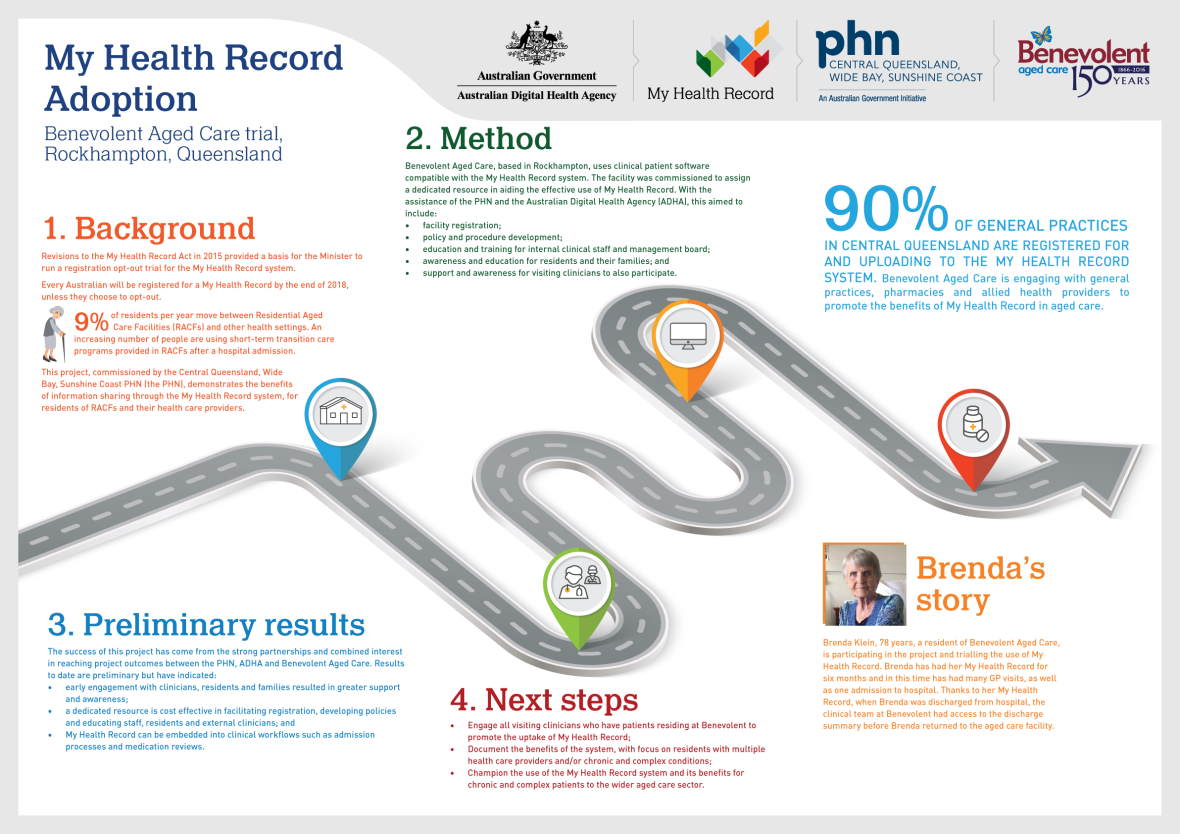Residential aged care gets connected through My Health Record
Published 27 July 2018
A Rockhampton Queensland initiative tests linkages between GPs, hospitals and Residential Aged care via My Health Record.
Transitions of care always carry the risk of losing vital patient information, which could lead to suboptimal care and adverse outcomes. These transitions are especially problematic for elderly patients, who are relatively likely to have multiple conditions and less likely to remember their medical history and medication regimes.1
Studies show that up to 9% of the residents in residential aged care facilities (RACFs) move between these facilities and other health settings.2 3 Moreover, increasing numbers of people are using short-term transition care programs provided in RACFs after hospital stays.
Paige Martinez, the Health System Improvement Manager at the Central Queensland, Wide Bay, Sunshine Coast PHN wanted to know if My Health Record could improve outcomes for patients in RACFs by linking their health information between GPs, allied health, and hospitals. So she reached out to Geoff Briggs at the Australian Digital Health Agency and Melissa Galvin at Benevolent Aged Care in Rockhampton to develop a pilot study.

L to R: Geoff Briggs, Paige Martinez and Melissa Galvin
Benevolent Aged Care was well placed to carry out this study, with a broad recognition among staff and management of the benefits that could be realised. Patient information at the facility is managed using iCareHealth, which supports My Health Record. Melissa worked with the PHN to locate an initial group of residents to volunteer for the study, and then worked with them to register them in the My Health Record system, liaising with their GPs and carers. Paige and Melissa also worked to educate and support the residents and families, and all clinicians involved. The project has gained great support through the entire population of Benevolent, with 97% of all residents now having a My Health Record, and all internal Benevolent clinicians now having access to My Health Record within the facility.
A poster presentation of this study was presented at the Rural Doctors Association of Queensland conference, which attracted a great deal of interest and enquiries.

Preliminary results have been encouraging. The study is finding that My Health Record can be embedded into clinical workflows such as admission processes and medications reviews, and that having a dedicated resource for facilitating necessary registration, developing policies and educating staff is cost effective. Early engagement with clinicians, residents and family is proving to be of value in gaining greater awareness and support.
Paige believes that the project has enhanced care outcomes at Benevolent. She commented, “Partnering with Benevolent Aged Care and the ADHA to be able to test the efficiency and effectiveness of My Health Record within Residential Aged Care has allowed us to see that having patient information on hand from across various settings makes it much easier and safer to transfer patients.”
CEO of Central Queensland, Wide Bay Sunshine Coast PHN, Pattie Hudson, believes that this pilot study will be able to help to guide similar implementations at other RACFs across Australia. “Bringing the My Health Record system into Benevolent Aged Care has allowed a greater understanding of the actual benefits of the My Health Record system within the aged care sector, and has provided a platform to be able to inform other health care providers about the benefits of the system for their elderly patients with chronic disease and co-morbidities,” she said.
- General Practice and Residential Aged Care Concordance of Medications (GRACE-Med) Study: A/Prof Meredith Makeham, Centre for Health Systems and Safety Research, Australian Institute of Health Innovation (AIHI). ↩
- Australian Institute of Health & Welfare (2010). Residential aged care in Australia 2008-09: a statistical overview. Aged care statistics series no.31 Cat. no. AGE 62, Canberra: AIHW. ↩
- Pharmacy Department, Austin Health; Aged Care Services, GP Liaison & Pharmacy Department, Northern Health; East Valley Division of General Practice; Centre for Medicine Use and Safety, Faculty of Pharmacy and Pharmaceutical Sciences, Monash University; Victoria, Australia (2010). The MedGap Project: A New Model of Care to Reduce the Risk of Medication-Related Problems at the Hospital-Residential Care Interface. Funded by: J.O. And J.R. Wicking Trust, March 2010. ↩